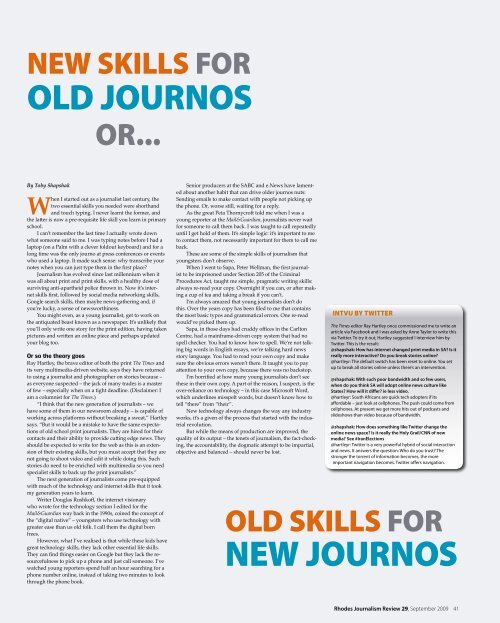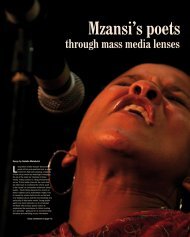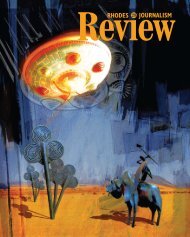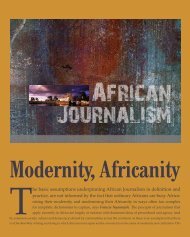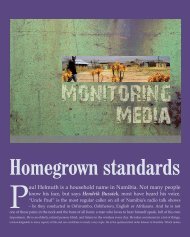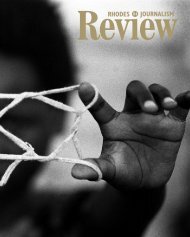Riding on the cup: - Rhodes Journalism Review - Rhodes University
Riding on the cup: - Rhodes Journalism Review - Rhodes University
Riding on the cup: - Rhodes Journalism Review - Rhodes University
You also want an ePaper? Increase the reach of your titles
YUMPU automatically turns print PDFs into web optimized ePapers that Google loves.
neW skills for<br />
old JoUrnos<br />
or...<br />
By Toby Shapshak<br />
When I started out as a journalist last century, <strong>the</strong><br />
two essential skills you needed were shorthand<br />
and touch typing. I never learnt <strong>the</strong> former, and<br />
<strong>the</strong> latter is now a pre-requisite life skill you learn in primary<br />
school.<br />
I can’t remember <strong>the</strong> last time I actually wrote down<br />
what some<strong>on</strong>e said to me. I was typing notes before I had a<br />
laptop (<strong>on</strong> a Palm with a clever foldout keyboard) and for a<br />
l<strong>on</strong>g time was <strong>the</strong> <strong>on</strong>ly journo at press c<strong>on</strong>ferences or events<br />
who used a laptop. It made such sense: why transcribe your<br />
notes when you can just type <strong>the</strong>m in <strong>the</strong> first place?<br />
<strong>Journalism</strong> has evolved since last millennium when it<br />
was all about print and print skills, with a healthy dose of<br />
surviving anti-apar<strong>the</strong>id police thrown in. Now it’s internet<br />
skills first, followed by social media networking skills,<br />
Google search skills, <strong>the</strong>n maybe news-ga<strong>the</strong>ring and, if<br />
you’re lucky, a sense of newsworthiness.<br />
You might even, as a young journalist, get to work <strong>on</strong><br />
<strong>the</strong> antiquated beast known as a newspaper. It’s unlikely that<br />
you’ll <strong>on</strong>ly write <strong>on</strong>e story for <strong>the</strong> print editi<strong>on</strong>, having taken<br />
pictures and written an <strong>on</strong>line piece and perhaps updated<br />
your blog too.<br />
Or so <strong>the</strong> <strong>the</strong>ory goes<br />
Ray Hartley, <strong>the</strong> brave editor of both <strong>the</strong> print The Times and<br />
its very multimedia-driven website, says <strong>the</strong>y have returned<br />
to using a journalist and photographer <strong>on</strong> stories because –<br />
as every<strong>on</strong>e suspected – <strong>the</strong> jack of many trades is a master<br />
of few – especially when <strong>on</strong> a tight deadline. (Disclaimer: I<br />
am a columnist for The Times.)<br />
“I think that <strong>the</strong> new generati<strong>on</strong> of journalists – we<br />
have some of <strong>the</strong>m in our newsroom already – is capable of<br />
working across platforms without breaking a sweat,” Hartley<br />
says. “But it would be a mistake to have <strong>the</strong> same expectati<strong>on</strong>s<br />
of old school print journalists. They are hired for <strong>the</strong>ir<br />
c<strong>on</strong>tacts and <strong>the</strong>ir ability to provide cutting edge news. They<br />
should be expected to write for <strong>the</strong> web as this is an extensi<strong>on</strong><br />
of <strong>the</strong>ir existing skills, but you must accept that <strong>the</strong>y are<br />
not going to shoot video and edit it while doing this. Such<br />
stories do need to be enriched with multimedia so you need<br />
specialist skills to back up <strong>the</strong> print journalists.”<br />
The next generati<strong>on</strong> of journalists come pre-equipped<br />
with much of <strong>the</strong> technology and internet skills that it took<br />
my generati<strong>on</strong> years to learn.<br />
Writer Douglas Rushkoff, <strong>the</strong> internet visi<strong>on</strong>ary<br />
who wrote for <strong>the</strong> technology secti<strong>on</strong> I edited for <strong>the</strong><br />
Mail&Guardian way back in <strong>the</strong> 1990s, coined <strong>the</strong> c<strong>on</strong>cept of<br />
<strong>the</strong> “digital native” – youngsters who use technology with<br />
greater ease than us old folk. I call <strong>the</strong>m <strong>the</strong> digital born<br />
frees.<br />
However, what I’ve realised is that while <strong>the</strong>se kids have<br />
great technology skills, <strong>the</strong>y lack o<strong>the</strong>r essential life skills.<br />
They can find things easier <strong>on</strong> Google but <strong>the</strong>y lack <strong>the</strong> resourcefulness<br />
to pick up a ph<strong>on</strong>e and just call some<strong>on</strong>e. I’ve<br />
watched young reporters spend half an hour searching for a<br />
ph<strong>on</strong>e number <strong>on</strong>line, instead of taking two minutes to look<br />
through <strong>the</strong> ph<strong>on</strong>e book.<br />
Senior producers at <strong>the</strong> SABC and e.News have lamented<br />
about ano<strong>the</strong>r habit that can drive older journos nuts:<br />
Sending emails to make c<strong>on</strong>tact with people not picking up<br />
<strong>the</strong> ph<strong>on</strong>e. Or, worse still, waiting for a reply.<br />
As <strong>the</strong> great Peta Thornycroft told me when I was a<br />
young reporter at <strong>the</strong> Mail&Guardian, journalists never wait<br />
for some<strong>on</strong>e to call <strong>the</strong>m back. I was taught to call repeatedly<br />
until I get hold of <strong>the</strong>m. It’s simple logic: it’s important to me<br />
to c<strong>on</strong>tact <strong>the</strong>m, not necessarily important for <strong>the</strong>m to call me<br />
back.<br />
These are some of <strong>the</strong> simple skills of journalism that<br />
youngsters d<strong>on</strong>’t observe.<br />
When I went to Sapa, Peter Wellman, <strong>the</strong> first journalist<br />
to be impris<strong>on</strong>ed under Secti<strong>on</strong> 205 of <strong>the</strong> Criminal<br />
Procedures Act, taught me simple, pragmatic writing skills:<br />
always re-read your copy. Overnight if you can, or after making<br />
a <strong>cup</strong> of tea and taking a break if you can’t.<br />
I’m always amazed that young journalists d<strong>on</strong>’t do<br />
this. Over <strong>the</strong> years copy has been filed to me that c<strong>on</strong>tains<br />
<strong>the</strong> most basic typos and grammatical errors. One re-read<br />
would’ve picked <strong>the</strong>m up.<br />
Sapa, in those days had cruddy offices in <strong>the</strong> Carlt<strong>on</strong><br />
Centre, had a mainframe-driven copy system that had no<br />
spell checker. You had to know how to spell. We’re not talking<br />
big words in English essays, we’re talking hard news<br />
story language. You had to read your own copy and make<br />
sure <strong>the</strong> obvious errors weren’t <strong>the</strong>re. It taught you to pay<br />
attenti<strong>on</strong> to your own copy, because <strong>the</strong>re was no backstop.<br />
I’m horrified at how many young journalists d<strong>on</strong>’t see<br />
<strong>the</strong>se in <strong>the</strong>ir own copy. A part of <strong>the</strong> reas<strong>on</strong>, I suspect, is <strong>the</strong><br />
over-reliance <strong>on</strong> technology – in this case Microsoft Word,<br />
which underlines misspelt words, but doesn’t know how to<br />
tell “<strong>the</strong>re” from “<strong>the</strong>ir”.<br />
New technology always changes <strong>the</strong> way any industry<br />
works, it’s a given of <strong>the</strong> process that started with <strong>the</strong> industrial<br />
revoluti<strong>on</strong>.<br />
But while <strong>the</strong> means of producti<strong>on</strong> are improved, <strong>the</strong><br />
quality of its output – <strong>the</strong> tenets of journalism, <strong>the</strong> fact-checking,<br />
<strong>the</strong> accountability, <strong>the</strong> dogmatic attempt to be impartial,<br />
objective and balanced – should never be lost.<br />
inTvU by TWiTTer<br />
The Times editor Ray Hartley <strong>on</strong>ce commissi<strong>on</strong>ed me to write an<br />
article via Facebook and I was asked by Anne Taylor to write this<br />
via Twitter. To try it out, Hartley suggested I interview him by<br />
Twitter. This is <strong>the</strong> result:<br />
@shapshak: How has internet changed print media in SA? Is it<br />
really more interactive? Do you break stories <strong>on</strong>line?<br />
@hartleyr: The default switch has been reset to <strong>on</strong>line. You set<br />
up to break all stories <strong>on</strong>line unless <strong>the</strong>re’s an interventi<strong>on</strong>.<br />
@shapshak: With such poor bandwidth and so few users,<br />
when do you think SA will adopt <strong>on</strong>line news culture like<br />
States? How will it differ? ie less video.<br />
@hartleyr: South Africans are quick tech adopters if its<br />
affordable – just look at cellph<strong>on</strong>es. The push could come from<br />
cellph<strong>on</strong>es. At present we get more hits out of podcasts and<br />
slideshows than video because of bandwidth.<br />
@shapshak: How does something like Twitter change <strong>the</strong><br />
<strong>on</strong>line news space? Is it really <strong>the</strong> Holy grail/CNN of new<br />
media? See #IranElecti<strong>on</strong>s<br />
@hartleyr: Twitter is a very powerful hybrid of social interacti<strong>on</strong><br />
and news. It answers <strong>the</strong> questi<strong>on</strong>: Who do you trust? The<br />
str<strong>on</strong>ger <strong>the</strong> torrent of informati<strong>on</strong> becomes, <strong>the</strong> more<br />
important navigati<strong>on</strong> becomes. Twitter offers navigati<strong>on</strong>.<br />
old skills for<br />
neW JoUrnos<br />
<strong>Rhodes</strong> <strong>Journalism</strong> <strong>Review</strong> 29, september 2009 41


